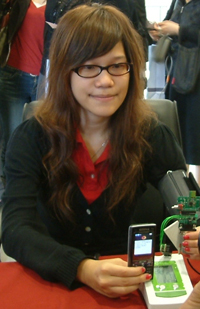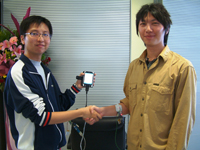A person needs only to install this communication device in his body (it can be stored in a watch or a cell phone), and when two persons equipped with the same device shake their hands, their personal information can be exchanged instantly, saving the trouble to store and sort out the paper-based business cards. Moreover, by simply touching this close- to- body receiver device, a person can complete the verification of his identity smoothly, without any complications. For instance, when a person enters an institute that has a security system which demands identity verification, he needs only to grip the handles of the security device lightly, and the doors will fling open immediately.
‧ Unification of standards: an open-end wireless sensor network platform
Under the strong support of the National Science Council, NTU's Professors Shey-shi Lu, Wen-Jong Wu, and Chih-ting Lin devoted themselves to the development and promotion of a short-range wireless sensor network platform. Integrating the outstanding production capability of the domestic electronic industry, which, coupled with the research energy of the NTU, they successfully developed a short-range wireless sensor platform which met with the specifications of zigbee. The performance of this platform is very similar to that of the platform developed by foreign manufacturers but costs only one tenth of the foreign counterpart. Furthermore, in view of the characteristics of the domestic industries and their R & D agenda, this platform will be offered free of charge to the domestic industries to enhance Taiwan's competitive capability in the international arena.
‧ Doctor on Demand: the Remote Health Care system
Incorporating the internet in one's body: exchanging information through a handshake
‧ Other technologies under development
Professor Tsung-Hsien Lin of the Institute of Electronic Engineering adopted a new circuit design concept, and developed a new biomedical chip needed for the wireless transceiver that could be swallowed by a patient. His new chip successfully lowered the power consumption rate of the transceiver and increased its transmission speed, making the biomedical chip fulfill its functions smoothly. President Si-chen Lee collaborated with Professor Chung-Ming Chen of the Institute of Biomedical Engineering and used dual band infrared detection technology to scan the activity patterns of chest cells. Since the cancer cells are normally much more active than normal cells, they were able to develop a screening technology for early stage breast cancer. This new screening technology is able to detect the presence of cancer cells before the cells developed into tumors.
Professor Chieh-hsiung Kuan of the Institute of Electronic Engineering focused his research topic on the development of detection technology of biological molecules. Since biological molecules have a tendency to affect the scattering spectrum of the infrared band when they are adhered to the detection chips which have a nanometer structure, Professor Kuan utilized this phenomenon and developed a high precision biological molecule detection chip. Moreover, because carrying an electrical charge is one of the basic physical properties of biological molecules, Professor Kuan was able to utilize the change in the alternating electrical field to measure the interaction between the biological molecules and the nano biomedical chip, thereby successfully developing a technology which could differentiate the types of biological molecules.
The latest research achievements of NTU's System on Chip Center exemplified the fact that academic energy and innovation could be substantiated into the development and transfer of actual technologies. The Center's success not only added new sparks to the domestic industries and academic circles, but also greatly enhanced their international competitiveness!!



